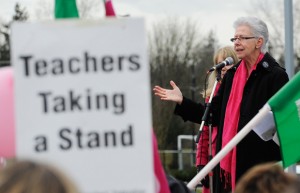Holly Hobbs, Fairfax Times, July 18, 2013– As the nation reflects on the verdict in the trial of George Zimmerman in the shooting of Trayvon Martin, a college course this fall will offer an academic look at the case’s impact outside of the courtroom.
George Mason University Professor Rutledge Dennis, a professor of sociology and anthropology, will teach “From Homer Plessy to Trayvon Martin: Issues in Race, Culture, and Politics,” which he said would look at historic cases involving race and their impacts on society. The course title has been abbreviated on Mason’s website: Plessy to Martin: Race and Politics.
“I hope our students will get out of it a sense of how racial, political and cultural issues impact how we interact,” Dennis said.
While the course aims to introduce students to historic themes through a contemporary example, Dennis and the university garnered much criticism online, mostly from conservative bloggers and media outlets like The Daily Caller, The National Review and Red Alert Politics.
“I have received a lot of nasty, hateful emails about this course because people assume it’s a course [only] about Trayvon Martin,” Dennis said. “Trayvon Martin is just one case.”
The course begins with coverage of the landmark 1896 Plessy v. Ferguson case, which upheld “separate but equal” racial segregation of public facilities. Students also will study other historic cases, such as the 1931 arrests of the “Scottsboro Boys,” a group of nine black teenagers who were accused of raping two white women in Alabama. The course includes a number of contemporary high-profile trials like the 1992 trials of Los Angeles police officers accused of beating construction worker Rodney King and the murder trial of former NFL running back O.J. Simpson, which ended in 1995.
Many of the trials included in the course syllabus occurred before most current undergraduate students were born. The Trayvon Martin case offers a current example and context for undergrads, Dennis said.
“The Trayvon Martin case is important academically because race and issues around race are academic issues,” Dennis said, adding that the humanities often study gender and class; so why not race? “While this case did not begin as a racial case, it ended as one.”
Mason Provost Peter Stearns says criticism of curriculum is not a common occurrence for the university, but it is also not unheard of.
“Regularly, university faculty deal with topics that have different viewpoints. [Previously] George Mason University has been accused of being too liberal and too conservative,” he said. “One of the challenges in teaching is you want to make sure students understand the historical context and themes. But we also want to make sure they can apply this knowledge to current issues.”
Dennis said he hopes his course will offer students the opportunity to debate why Martin’s death and Zimmerman’s trial sparked intense media coverage and debate.
“I think it got attention for many people because we have an unarmed teenager who was shot by someone of another ethnic group,” Dennis said. “Young black men have been taken advantage of by the system. … And this becomes, for many, another example of a young black man being taken advantage of by the system.”
As of Wednesday, 16 students had registered for Dennis’ class (AFAM 390), which is cross-listed as both an African and African American Studies and Sociology/Anthropology course.

 Follow
Follow